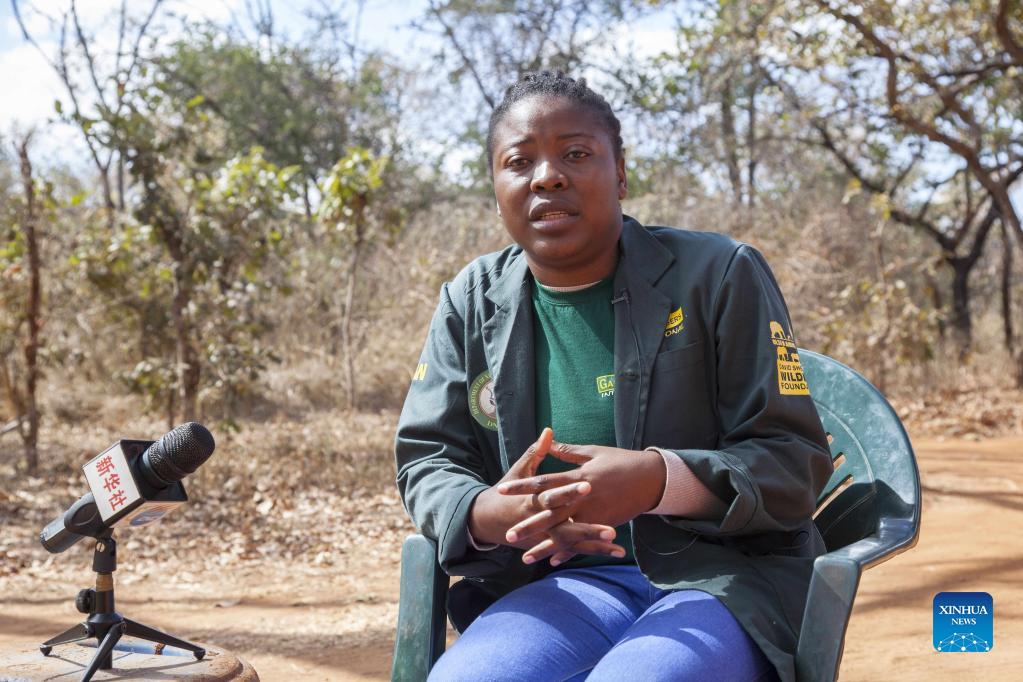
Mary Muyoyeta, a research assistant and support manager, speaks during an interview at an elephant nursery in Lilayi, south of Lusaka, Zambia, on July 30, 2021. While elephant poaching causes decimation to the species' population and is widely blamed, another aspect of poaching also requires more attention -- that is the bereaved baby elephants. (Photo by Martin Mbangweta/Xinhua)
LUSAKA, Oct. 11 (Xinhua) -- While elephant poaching causes decimation to the species' population and is widely blamed, another aspect of poaching also requires more attention -- that is the bereaved baby elephants.
The killing of elephants that are nursing babies by poachers has left the baby elephants without any motherly care. Apart from poaching, human-animal conflict is also a threat to the elephants, with the baby elephants being the major victims of these conflicts.
But the baby elephants have found solace at an orphanage where motherly care is provided for them until they grow up. The Elephant Orphanage Project is an initiative under the Game Rangers International (GRI), a non-profit conservation organization that is giving the baby elephants a home and family before releasing them back into the wild.
The orphanage was established in 2008 in partnership with Zambia's Department of National Parks and Wildlife. Since then, 18 baby elephants have been supported at the Nursery situated at Lilayi, south of Lusaka, the Zambian capital. Currently, four baby elephants are at the Nursery after the relocation of two others recently.
The baby elephants are taken care of by keepers who act as their second mothers. The elephants drink two liters of bottled formula milk every three hours and would consume up to 16 liters of milk every 24 hours.
Apart from that, the elephants are taken for walks in nearby bushes where they are allowed to browse trees and grass.
Oscar Shumbwamuntu is one of the keepers who has been working with the project for more than 10 years and is currently the Deputy Head Keeper.
Shumbwamuntu not only goes into the national parks to rescue the baby elephants but also has the task of rehabilitating them after being traumatized by witnessing the gruesome killing of their mothers.
He said in an interview that the baby elephants are taken into the bush where they are taught natural things like browsing and playing in the mud.
Mary Muyoyeta, a research assistant and support manager said the project has various components, including community outreach, resource protection and wildlife rescue, forming a holistic approach to wildlife conservation.
The community outreach program aims to empower communities living alongside wildlife so that they benefit and therefore contribute to the preservation of wild animals, including elephants.
The communities living near game management areas have been sensitized to spot orphaned elephants in the national parks and later alert the scouts who go to rescue them.
According to Muyoyeta, out of the four baby elephants currently at the orphanage, three are orphaned due to the consequence of human-animal conflict while one was a victim of ivory poaching.
The communities, she said, are being sensitized on how to relate with the animals by coming up with projects to mitigate the human-animal conflict, such as improved kraals for cattle to keep them safe from lion attacks.
Others include different deterrents for elephants from crop-raiding that include growing unpalatable crops, using a homemade elephant repellent, and the use of chili powder, airhorns and lights to chase elephants away.
The communities are also being empowered with other income-generating activities to deter them from engaging in poaching as a way to preserve the elephant population.
Currently, the project depends on donors for its financing while other financing mechanisms include daily fees charged on people who go to view the animals at the orphanage. The project has a viewing platform located at the entrance to the orphanage.
The project also has a virtual adoption system where people can adopt individual baby elephants at a cost of 68 U.S. dollars per year.
Muyoyeta has since appealed for more financial support because taking care of the baby elephants requires a lot of money. She further called for the protection of elephants that are endangered in order to preserve them for future generations. Enditem